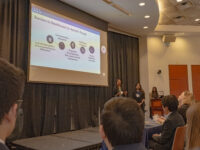Although still a relatively new field, the applications and possibilities of artificial intelligence (AI) are rapidly expanding. AI technology has been utilized in virtual assistants and chatbots in customer service, fraud detection and risk assessment in finance, surveillance and threat detection in law enforcement, and much more. Especially in this past year, AI has made significant advancements in the healthcare field.
Healthcare has mainly made use of AI regarding IoT (Internet of Things) devices. Glucose monitors and ingestible sensors can provide data for AI to analyze, interpret, and automate. Recent technological advancements have allowed for the exploration of artificial intelligence as a tool to even predict disease.
Using optical coherence tomography (OCT), doctors can now assess ocular diseases and identify biomarkers of other systemic diseases. OCT is a rapid, non-invasive imaging technique that uses a machine to take cross-section pictures of the retina using light waves, allowing for the analysis of different eye components. Some examples include retinal layers, fluid, or vasculature, in which OCT can detect abnormalities that can indicate early signs of disease. Research has found that structural changes in neurosensory retinal layers can indicate the presence of Alzheimer’s disease.
“The automated detection of these biomarkers using machines allows for early diagnoses, which are crucial and can be life-saving.”
The automated detection of these biomarkers allows for early diagnoses, which are crucial and can be life-saving. For conditions with known cures, early interpretation of biomarkers can catch diseases in their early stages, resulting in increased effectiveness of treatment and a faster cure due to early intervention. Though some diseases, such as Alzheimer’s, do not currently have cures, early detection can greatly improve the treatment and quality of life experienced by patients — and maybe even extend their lives.
There are still, however, some potential risks regarding AI technology. Image interpretation can be subjective, and the accuracy and ability of AI to replicate the expertise of doctors with medical degrees and years of experience is a concern. In addition, the security of patient health data and personal information is an issue with the machines and AI algorithms accessing this data. Despite these concerns, the novelty of this field signifies there is much to explore and unlocked potential to harness. The applications of this rapidly expanding field of technology show great promise in terms of healthcare and longevity.






